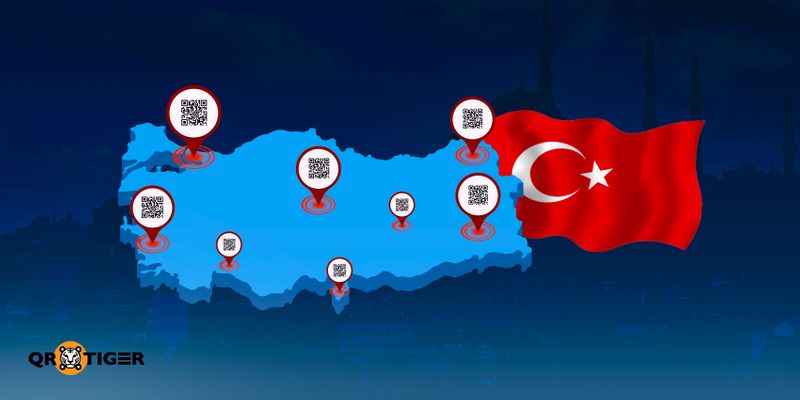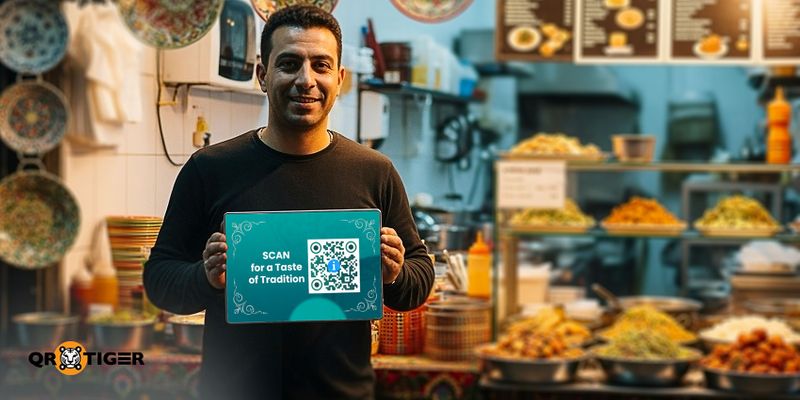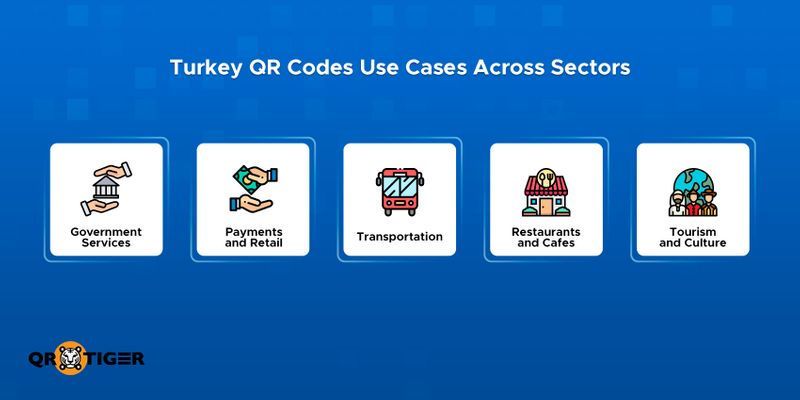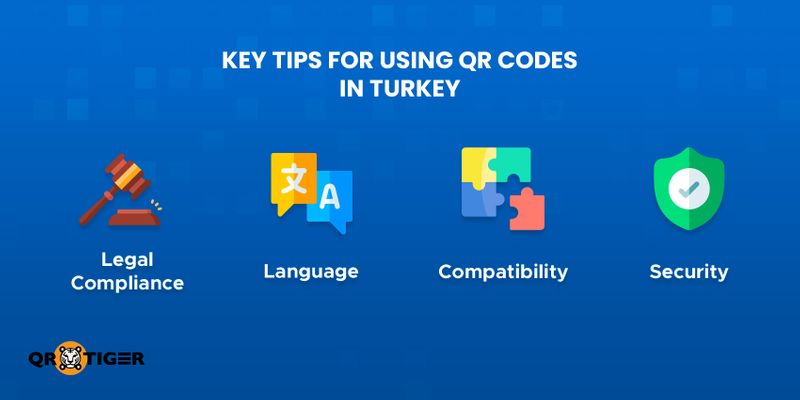QR Code στην Τουρκία: Από την Ευκολία στον Καθημερινό Πρότυπο

Η χρήση του κωδικού QR στην Τουρκία έχει αυξηθεί πέρα από μια τάση. Η τεχνολογία είναι ήδη βαθιά ριζωμένη στις καθημερινές υπηρεσίες και συστήματα, καθιστώντας το ένα ανακινητό μέρος της τουρκικής ζωής.
Από εργοστασιακά εμφιαλωμένα καραμέλες μέχρι κυρίως άρθρα πρωτοσέλιδων, τα QR codes έχουν εισέλθει στα σημεία επαφής με τους καταναλωτές της Τουρκίας, τα μέσα ενημέρωσης και, πιο ειδικά, τα σχέδια της κυβέρνησης.
Ως το πρότυπο στη χώρα, οι επιχειρήσεις απευθύνονται σε έναν γεννήτορα κωδικών QR για ασφαλείς, σύμφωνους με τη μάρκα τους και εντοπίσιμες λύσεις κωδικών QR, προκειμένου να γίνουν πιο ανταγωνιστικές και ισχυρές οντότητες στις αντίστοιχες βιομηχανίες τους.
Πώς έφτασε η υιοθέτηση του QR κώδικα από την Τουρκία εδώ και πού κατευθύνεται; Ας ρίξουμε μια πιο προσεκτική ματιά σε πώς αυτή η τεχνολογία δισδιάστατου γραμμικού κώδικα αναδιαμορφώνει δυναμικά την καθημερινή ζωή σε ολόκληρη τη χώρα.
Πίνακας περιεχομένων
- Ο αυξανόμενος ρόλος του QR κώδικα στην Τουρκία
- Τουρκικές μάρκες με τον καλύτερο γεννήτρια QR κωδικών
- Χρήσεις κωδικών QR στην Τουρκία σε διάφορους τομείς
- 4 πράγματα που πρέπει να θυμάστε πριν χρησιμοποιήσετε QR κώδικες στην Τουρκία
- Τι ακολουθεί για τους κωδικούς QR στην Τουρκία;
- Η ψηφιακή άλματα της Τουρκίας με QR κώδικες
- Συχνές Ερωτήσεις
Ο αυξανόμενος ρόλος του κωδικού QR στην Τουρκία

Η υιοθέτηση των QR κωδικών από την Τουρκία αυξήθηκε το 2020, όπως και σε πολλά μέρη του κόσμου. Η αντίδραση της Τουρκίας στον κορωνοϊό με QR κώδικες πρωτοπορεί σε αυτό, όπου η σάρωση αντικατέστησε την αφή σε δημόσιους χώρους.
Αλλά αυτό που ξεκίνησε ως μια προσωρινή λύση για την ασφάλεια έμεινε. Και αυξήθηκε γρήγορα. Τα QR codes πέρασαν από το να είναι προσωρινά, όπως το τουρκικό QR code υγείας, σε απαραίτητα εργαλεία για πληρωμές, τιμολόγια και άλλες κυβερνητικές ενέργειες στη χώρα.
Πληρωμή με QR κώδικα στην Τουρκία
Η Τράπεζα της Τουρκίας (CBRT) τυποποίησε την Κωδικός QR για πληρωμή να κάνει τις συναλλαγές πιο γρήγορες, πιο καθαρές και πιο ασφαλείς.
Γνωστό ως "TR QR Code," αυτή η τυποποίηση συμμορφώνεται με την προθειμένη προσπάθεια να εγκαθιδρυθεί η ασύρματη και ηλεκτρονική πληρωμή στη χώρα.
Οι χρήστες μπορούν να δημιουργήσουν αυτόν τον κωδικό QR μέσω των παρόχων υπηρεσιών πληρωμών (PSPs) που είναι εξουσιοδοτημένοι από την CBRT. Παράλληλα, οι PSPs επιτρέπεται να χρησιμοποιούν έναν εξωτερικό Δημιουργός κώδικα QR λογισμικό
Με την εφαρμογή ενός εθνικού προτύπου QR κώδικα στην Τουρκία, η αξία των ψηφιακών πληρωμών, ειδικά οι συναλλαγές βασισμένες σε QR κώδικα, έφτασε τα 16,6 δισεκατομμύρια τουρκικά λίρα (περίπου 407.627.246,12 δολάρια) το 2022, μια αύξηση 318% από το προηγούμενο έτος.
QR κώδικας στις ηλεκτρονικές τιμολογίες της Τουρκίας
Τον Σεπτέμβριο του 2023, η Τουρκική Αρχή Εσόδων (TRA) απαιτούσε QR κώδικες σε βασικά ηλεκτρονικά έγγραφα, όπως τις ηλεκτρονικές τιμολόγιο e-Fatura, τις ηλεκτρονικές τιμολόγιο e-Arşiv και τις ηλεκτρονικές αποδείξεις παράδοσης.
Αυτή η πρωτοβουλία διαδραματίζει σημαντικό ρόλο στην ενίσχυση της εμπιστοσύνης στις φορολογικές αρχές και στην ανάκτηση φόρων που χάθηκαν λόγω απάτης. Η διαφάνεια των συναλλαγών βοηθά στη διασφάλιση της ακρίβειας και του ελέγχου των δεδομένων τιμολογίων.
Οι επιχειρήσεις προς επιχειρήσεις (B2B) και επιχειρήσεις προς κυβέρνηση (B2G) υποχρεούνται να ενσωματώσουν QR κώδικες στις ηλεκτρονικές τους τιμολογίες. Ταυτόχρονα, οι επιχειρήσεις προς καταναλωτές (B2C) πρέπει να έχουν αυτούς τους κώδικες συμπεριληφθεί στο Ηλεκτρονικό Αρχείο, μαζί με τις B2Bs.
Σύστημα επιθεώρησης κώδικα QR
Τον Ιούλιο του 2025, η Τουρκία έκανε άλλο ένα μεγάλο βήμα. Το Υπουργείο Γεωργίας και Δασοκομίας καθιέρωσε υποχρεωτικό το σύστημα ελέγχου με QR κώδικα για τις τροφικές εγκαταστάσεις, συμπεριλαμβανομένων σούπερ μάρκετ, κρεοπωλείων, πρατηρίων φρούτων και λαχανικών, καφετεριών και εστιατορίων.
Από τις 28 Ιουλίου 2025, οι επιχειρήσεις πρέπει να εμφανίζουν ένα μοναδικό QR κώδικα που οι καταναλωτές μπορούν να σκανάρουν χρησιμοποιώντας την εφαρμογή "Ταρίμ Τζεμπίμντε". Το σάρωμα αποκαλύπτει πληροφορίες εγγραφής, διεύθυνση και ημερομηνία του τελευταίου επίσημου ελέγχου.
Υποχρεωτική ετικέτα QR για εισαγωγές στην Τουρκία
Εκτός από αυτό, το Υπουργείο Εμπορίου της Τουρκίας απαιτεί Ετικέτες QR κώδικα σε εισαγόμενα αγαθά για τη βελτίωση της ανιχνευσιμότητας του προϊόντος και της εμπιστοσύνης του καταναλωτή.
Αυτή η κίνηση βοηθάει τις επιχειρήσεις και τους αγοραστές να επιβεβαιώσουν την αυθεντικότητα και να συμμορφωθούν με τους κανονισμούς πιο εύκολα.
Τα QR codes μπορούν να δημιουργηθούν δωρεάν μέσω της guvenilirgida.tarimorman.gov.tr, και δεν απαιτείται γραφειοκρατία. Οι επιχειρήσεις που δεν συμμορφώνονται κινδυνεύουν με πρόστιμα.
Τουρκικά brands που λειτουργούν με τον καλύτερο γεννήτρια QR κωδικών

Δύο δημοφιλείς τοπικές μάρκες στην Τουρκία προσέχουν σοβαρά την υιοθέτηση των κωδικών QR, βασιζόμενες στον πάροχο κωδικών QR QR TIGER που είναι παγκοσμίως αξιόπιστος.
Ας εξερευνήσουμε πώς χρησιμοποιούν τους κωδικούς QR, όχι μόνο για συμμόρφωση, αλλά και για να προσφέρουν καλύτερες εμπειρίες στους καταναλωτές.
Δουρουκάν
Ο Durukan είναι ένας από τους γνωστούς κατασκευαστές ζαχαρωτών στην Τουρκία. Πιθανόν να έχετε δει τα πολύχρωμα γλυκίσματά τους σε καταστήματα, αγορές ή αυτόματα πώλησης.
Χρησιμοποιώντας το QR TIGER, ο Durukan προσθέτει σάρωσης εμπειρίες απευθείας στη συσκευασία του. Σκεφτείτε QR κωδικούς προϊόντων που οδηγούν σε προσφορές, πληροφορίες συστατικών ή διαδραστικά παιχνίδια για παιδιά. Μετατρέπει ένα σνακ σε πύλη για την αλληλεπίδραση με τον πελάτη χωρίς την ανάγκη για νέα εφαρμογή.
Για μια εταιρεία που φτάνει χιλιάδες καταναλωτές καθημερινά, αυτό το επιπλέον ψηφιακό επίπεδο μπορεί να είναι το ιδανικό σημείο ορατότητα εταιρικού brand και πιστότητα.
Κοτζαέλι Γκαζέτεσι
Ως ημερήσια εφημερίδα της επαρχίας Κοτζαέλι, η Κοτζαέλι Γκαζέτεσι είναι περισσότερο από απλά τοπική· αποτελεί μέρος της καθημερινής ρουτίνας για χιλιάδες αναγνωστές.
Χρησιμοποιώντας τις ευέλικτες λύσεις QR της QR TIGER, ενσωματώνουν κώδικες QR σε έντυπα άρθρα, επιτρέποντας στους αναγνώστες να μεταβούν από τα άρθρα στο διαδικτυακό περιεχόμενο, συνεντεύξεις ή εξηγητικά βίντεο. Είναι ένας γέφυρα από τα παραδοσιακά μέσα ενημέρωσης στην ψηφιακή αλληλεπίδραση, όλα με ένα σάρωσμα.
Αυτή η υβριδική προσέγγιση βοηθά τις εφημερίδες να παραμείνουν σχετικές ενώ διατηρούν την ομαλή και εύχρηστη εμπειρία ανάγνωσης.
Χρήσεις κωδικών QR στην Τουρκία σε διάφορους τομείς

Τα QR codes είναι ορατά σε πολλές καθημερινές στιγμές, από τα μετρό της πόλης μέχρι τις γωνιές των καφετεριών. Ακολουθούν μερικοί κλάδοι που ηγούνται:
Υπηρεσίες της κυβέρνησης
Η πλατφόρμα e-Devlet (ηλεκτρονική κυβέρνηση) της Τουρκίας έχει ήδη ψηφιοποιήσει πολλές δημόσιες υπηρεσίες, αλλά οι κωδικοί QR έχουν βοηθήσει να τις κάνουν πιο προσβάσιμες.
Οι κάτοικοι μπορούν τώρα να σκανάρουν κωδικούς για:
- Ελέγξτε φορολογικά ή οχημάτων αρχεία
- Αποκτήστε πρόσβαση σε πύλες υγείας
- Επαληθεύστε ψηφιακά αναγνωριστικά ή έγγραφα
- Πληρώστε πρόστιμα ή διόδια
- Τουρκία υγεία QR κωδικός
Κατά τη διάρκεια της πανδημίας, το Υπουργείο Υγείας της Δημοκρατίας της Τουρκίας χρησιμοποιήθηκε συχνά το QR κώδικα για την καταγραφή των εμβολιασμών και την απαλλαγή από ταξίδια.
Οι δημοτικές υπηρεσίες τοποθετούν επίσης κωδικούς QR έξω από κτίρια ή σε φυλλάδια, συνδέοντας τους πολίτες με τα online συστήματα ραντεβού ή ενημερώσεις έκτακτης ανάγκης.
Πληρωμές και λιανικό εμπόριο
Με τα ψηφιακά πορτοφόλια όπως το FAST (Fonların Anlık ve Sürekli Transferi) να κερδίζουν έδαφος, οι πληρωμές βασισμένες σε QR γίνονται τυπικές στο λιανικό εμπόριο. Χωρίς κάρτες, χωρίς μετρητά, απλά σάρωση και πήγαινε.
Ακόμα και μικρά περίπτερα στις πόλεις όπως η Σμύρνη ή η Βούρσα δέχονται τώρα πληρωμές μέσω QR μέσω των τουρκικών τραπεζικών εφαρμογών όπως η Ζίραατ, η Ίσμπανκ ή η Ακμπανκ.
Μεγαλύτερα καταστήματα χρησιμοποιούν συχνά δυναμικός κωδικός QR λύσεις για την ενεργοποίηση άμεσων καμπανιών όπως περιορισμένες εκπτώσεις, πόντοι πιστότητας ή ψηφιακά αποδεικτικά.
Μεταφορά
Το μετρό της Κωνσταντινούπολης και το σιδηροδρομικό σύστημα Marmaray άρχισαν να εισάγουν συστήματα εκδίδοντα εισιτηρίων βασισμένα σε QR. Οι επιβάτες μπορούν να σαρώνουν τους κωδικούς QR από εφαρμογές μεταφοράς αντί για χαρτιά εισιτηρίων ή κάρτες RFID.
Οι λεωφορεία μεταξύ πόλεων και οι ιδιωτικές υπηρεσίες μεταφοράς ακολουθούν το παράδειγμα, προσφέροντας ψηφιακά εισιτήρια με QR είσοδο, παρακολούθηση σε πραγματικό χρόνο και online κανάλια υποστήριξης.
Εστιατόρια και καφετέριες
Τα μενού, οι φόρμες ανατροφοδότησης και οι κωδικοί QR πληρωμής είναι πλέον απαραίτητα για τον κλάδο τροφίμων και ποτών.
Από μοντέρνα μέρη στο Καρακόι μέχρι οικογενειακά εστιατόρια στη Γαζιαντέπ, δυναμικά μενού QR επιτρέπουν στους πελάτες να περιηγηθούν σε ενημερωμένα πιάτα, να αλλάξουν γλώσσα, ή να αφήσουν κριτικές, όλα χωρίς να χειρίζονται ένα φυσικό μενού.
Τουρισμός και πολιτισμός
Οι τουριστικοί φορείς και οι δημοτικοί συμβούλιοι έχουν υιοθετήσει την τεχνολογία QR για να βοηθήσουν τους ταξιδιώτες να εξερευνήσουν. Οι διεθνείς ταξιδιώτες μπορεί να θυμούνται ότι χρησιμοποίησαν έναν κωδικό QR για να εισέλθουν στην Τουρκία κατά τη διάρκεια των περιορισμών ταξιδίων COVID-19, οι οποίοι διευκόλυναν τις διαδικασίες υγείας και άφιξης.
Στην Κωνσταντινούπολη, ιστορικά περιοχές όπως η Σουλταναχμέτ πλέον διαθέτουν πινακίδες με QR κώδικες που εξηγούν τα αξιοθέατα σε πολλές γλώσσες. Οι εκμεταλλεύσεις αερόστατων στην Καππαδοκία χρησιμοποιούν QR κώδικες για τον έλεγχο εισιτηρίων και τις αλλαγές στο πρόγραμμα.
Ακόμα και μερικά τέμενη και μουσεία ενσωματώνουν κώδικες για εικονικές περιηγήσεις ή ιστορίες αντικειμένων.
4 πράγματα που πρέπει να θυμάστε πριν χρησιμοποιήσετε QR κώδικες στην Τουρκία

Η χρήση των κωδικών QR στην Τουρκία είναι απλή, αλλά το να το κάνετε σωστά σημαίνει να δίνετε προσοχή σε μερικά βασικά σημεία:
Ακολουθήστε τους νόμους περί δεδομένων και διαφήμισης
Οι τουρκικοί νόμοι, όπως ο Νόμος για την Προστασία των Προσωπικών Δεδομένων (Kişisel Verilerin Korunması Kanunu) (Νόμος Αριθ. 6698), ρυθμίζουν τη χρήση και την ιδιωτικότητα των Ϩηφικών δεδομένων.
Αν η καμπάνια QR κωδικού σας στην Τουρκία συλλέγει οποιαδήποτε δεδομένα χρήστη όπως emails ή πληροφορίες πληρωμής, πρέπει να συμμορφώνεται με τους τοπικούς κανόνες συμμόρφωσης.
Χρησιμοποιήστε λογισμικό πιστοποιημένο με ISO-27001 όπως το QR TIGER για να εξασφαλίσετε ότι οι κωδικοί QR σας είναι ασφαλείς και έτοιμοι για τον Γενικό Κανονισμό Προστασίας Δεδομένων (GDPR).
Τοπικοποιήστε την εμπειρία σας
Η πλειοψηφία των τουρκικών καταναλωτών προτιμούν τα τουρκικά από τα αγγλικά. Επομένως, είτε πρόκειται για μια σελίδα προορισμού προϊόντος, προώθηση ή φόρμα ανατροφοδότησης, βεβαιωθείτε ότι είναι στην κατάλληλη γλώσσα.
💡 Γρήγορη ιδέα: Εάν η εστίασή σας είναι στους τουρίστες, παρέχετε πολύγλωσση υποστήριξη. Χρησιμοποιήστε ένα Smart URL QR κώδικα με ανακατεύθυνση γλώσσας για να οδηγήσετε γρήγορα τους χρήστες σε μια σελίδα που μπορούν να καταλάβουν (βασισμένη στη γλώσσα της συσκευής τους).
Κάντο συμβατό
Τα QR κώδικά σας πρέπει να σαρώνονται εύκολα χρησιμοποιώντας τηρκικές εφαρμογές και υπηρεσίες. Δοκιμάστε το σε όλες τις σχετικές συσκευές, από iPhones και Androids μέχρι τοπικές πλατφόρμες όπως το Yandex Navigation ή τις τραπεζικές εφαρμογές.
Αποφύγετε επίσης υπερβολικά πολύπλοκα σχέδια. Αν φαίνονται όμορφα αλλά δεν σαρώνουν σε ένα δευτερόλεπτο, δεν αξίζουν.
Δίνε προτεραιότητα στην ασφάλεια
Χρησιμοποιήστε το πρωτόκολλο HTTPS Συνδέσεις. Ενεργοποιήστε την προστασία με κωδικό πρόσβασης ή τη λήξη όταν μοιράζεστε υψηλά εμπιστευτικές πληροφορίες χρησιμοποιώντας κωδικούς QR.
Εάν ελέγχετε την πρόσβαση σε ένα γεγονός, ένα αρχείο ή μια είσοδο, χρησιμοποιήστε δυναμικούς κωδικούς QR για να παρακολουθείτε τη χρήση και να κάνετε ενημερώσεις αμέσως.
Τι ακολουθεί για τους κωδικούς QR στην Τουρκία;
Η χρήση των κωδικών QR στην Τουρκία δείχνει καμία ένδειξη επιβράδυνσης. Πράγματι, επιταχύνεται.
Οι κυβερνητικοί φορείς πιέζουν όλο και περισσότερο για την ψηφιοποίηση. Τα συστήματα λιανικής πώλησης και πληρωμών μετακινούνται προς μια προσέγγιση πρώτα από κινητό. Και οι καταναλωτές; Είναι πιο ανοιχτοί από ποτέ στο να αλληλεπιδρούν με εταιρείες μέσω κωδικών QR.
Μπορούμε να περιμένουμε να δούμε:
- Περισσότερη χρήση QR εισιτηρίων στις δημόσιες συγκοινωνίες
- Εκτεταμένα μενού QR με ενσωματωμένη δυνατότητα παραγγελίας και πληρωμής
- Καμπάνιες μάρκετινγκ με δυνατότητα QR κώδικα και ανάλυση πραγματικού χρόνου
- Δυναμικοί κωδικοί QR που τροφοδοτούν καινοτόμα αστικά έργα στην Άγκυρα, την Αντάλυα και πέρα
Η ψηφιακή άλματα της Τουρκίας με QR κώδικες
Ο κωδικός QR στην Τουρκία έχει εξελιχθεί από ένα εργαλείο άνεσης σε κύριο μέρος των καθημερινών αλληλεπιδράσεων.
Από το λιανικό εμπόριο μέχρι τις σιδηροδρομικές εταιρείες, οι τουρκικές επιχειρήσεις αποδεικνύουν ότι ένα απλό σάρωμα μπορεί να ξεκλειδώσει πιο έξυπνες, ταχύτερες και πιο συνδεδεμένες εμπειρίες.
Με έναν προηγμένο γεννήτρια QR κωδικών που υποστηρίζει αυτήν τη μετατόπιση, αναμένεται οι QR κωδικοί να συνεχίσουν να διαμορφώνουν τον τρόπο με τον οποίο οι άνθρωποι κάνουν αγορές, ταξιδεύουν και αλληλεπιδρούν.
Η μάρκα σας μπορεί να γίνει η επόμενη επιτυχημένη ιστορία QR κώδικα της Τουρκίας. Ξεκινήστε ένα ταξίδι Freemium μαζί μας και δημιουργήστε την πρώτη σας δυναμική καμπάνια QR κώδικα δωρεάν. 
Συχνές Ερωτήσεις
Πώς μπορώ να πληρώσω με QR κωδικό στην Τουρκία;
Για να πληρώσετε χρησιμοποιώντας έναν κωδικό QR, ανοίξτε την εφαρμογή τραπεζικών συναλλαγών στο κινητό σας ή μια υποστηριζόμενη πλατφόρμα πληρωμών, σαρώστε τον κωδικό QR στο POS ή στο τιμολόγιο, επιλέξτε τον τρόπο πληρωμής σας (χρεωστική κάρτα, πιστωτική κάρτα ή ψηφιακό πορτοφόλι) και επιβεβαιώστε τη συναλλαγή.
Ποιος κωδικός χρησιμοποιείται στην Τουρκία;
Ο κωδικός χώρας που χρησιμοποιείται στην Τουρκία είναι +90.
Ποιο είναι το ψηφιακό κωδικό της Τουρκίας;
Ο κωδικός γραμμοκώδικα της Τουρκίας χρησιμοποιεί γραμμοκώδικες μορφής EAN-13 με κωδικούς χώρας που αρχίζουν από 868-869. 


